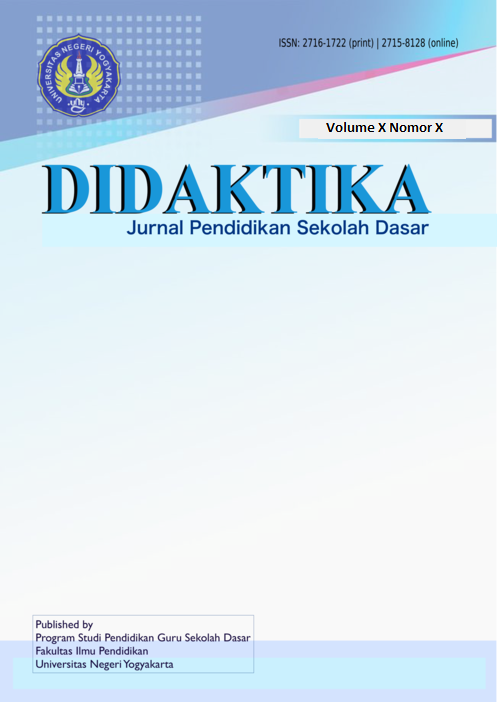The Feasibility Study of Moodle-Based E-Module to Increase The Numeration Literacy of Elementary School Students
DOI:
https://doi.org/10.21831/didaktika.v4i2.41034Abstract
References
Abidin, Mulyati, Y., Yunansah, T. & Hana. (2021). Pembelajaran Literasi: Strategi Meningkatkan Kemampuan Literasi Matematika, Sains, Membaca, dan Menulis. Jakarta: Bumi Aksara.
Asyhar, R. (2012). Kreatif Mengembangkan Media Pembelajaran. Jakarta: Referensi.
Batubara, H.H. (2018). Pembelajaran Berbasis Web Dengan Moodle Versi 3.4. Yogyakarta: Deepublish.
Hamdani. (2017). Strategi Belajar Mengajar. 6th ed. Bandung: CV. Pustaka Setia.
Herayanti, L., Fuaddunnazmi, M. & Habibi, H. (2017). Pengembangan Media Pembelajaran Berbasis Moodle pada Mata Kuliah Fisika Dasar. Jurnal Pendidikan Fisika dan Teknologi, 1(3): 205.
Ibrahim, G.A., Ismadi, H.D., Zabadi, F., Ali, N.B. V., Alipi, M., Antoro, B., Hanifah, N., Miftahussururi, Nento, M.N., Akbari, Q.S. & Aziz, M. (2017). Peta Jalan Gerakan Literasi Nasional. Jakarta: Direktorat Jenderal Pendidikan Dasar dan Menengah Kementerian Pendidikan dan Kebudayaan.
OECD. (2018). PISA 2021 Mathematics Framework (Draft). Paris: OECD Publishing.
Prihartini, F.W. (2017). Analisis Pelaksanaan Gerakan Literasi Sekolah (GLS) Pada Kelas Rendah di SDN Punten 1 Batu.
Pusmenjar. (2020). Desain Pengembangan Soal AKM. Jakarta: Badan Penelitian dan Pengembangan dan Perbukuan.
Rahayu, Y.D. (2021). Meningkatkan Aktivitas Dan Hasil Belajar Materi Bangun Datar Melalui Media Puzzle Pada Siswa Kelas II SDN Teguhan 02 Kecamatan Jiwan Kabupaten Madiun Tahun Pelajaran 2018-2019. Jurnal Ilmiah Pengembangan Pendidikan (JIPP), 8(1).
Sitepu, B.P. (2015). Penulisan Buku Teks Pelajaran. Bandung: Remaja Rosdakarya.
Suarsana, I.M. (2013). Pengembangan E-Modul Berorientasi Pemecahan Masalah untuk Meningkatkan Keterampilan Berpikir Kritis Mahasiswa. JPI (Jurnal Pendidikan Indonesia), 2(2): 193–200.
Sugiyono. (2015). Metode Penelitian Pendidikan (Pendekatan Kuantitatif, Kualitatif, dan R&D). Bandung: Alfabeta.
Zulkarnain, A., Kadaritna, N. & Tania, L. (2015). Pengembangan E-Modul Teori Atom Mekanika Kuantum Berbasis Web Dengan Pendekatan Saintifik. Jurnal Pendidikan dan Pembelajaran Kimia, 4(1): 222–235.
Downloads
Published
How to Cite
Issue
Section
Citation Check
License
- Authors retain copyright and grant the journal right of first publication with the work simultaneously licensed under a Creative Commons Attribution License that allows others to share the work with an acknowledgement of the work's authorship and initial publication in this journal.
- Authors are able to enter into separate, additional contractual arrangements for the non-exclusive distribution of the journal's published version of the work (e.g., post it to an institutional repository or publish it in a book), with an acknowledgement of its initial publication in this journal.
- Authors are permitted and encouraged to post their work online (e.g., in institutional repositories or on their website) prior to and during the submission process, as it can lead to productive exchanges, as well as earlier and greater citation of published work.






